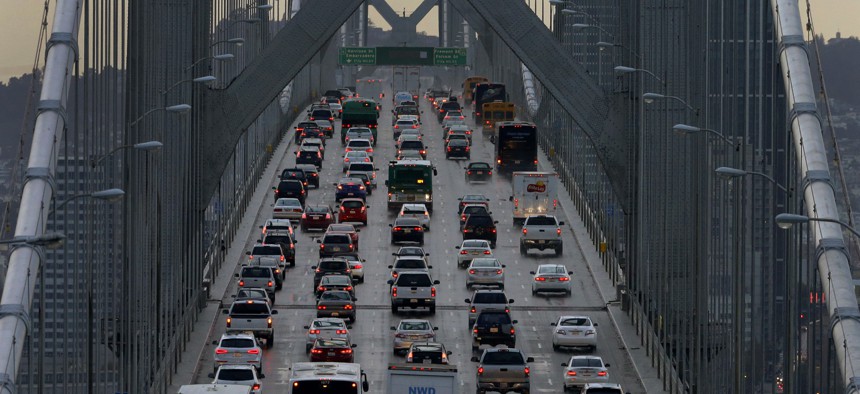EPA, California Clash Over Breakdown in Fuel Efficiency Standard Talks

In this Dec. 10, 2015, file photo, vehicles make their way westbound on Interstate 80 across the San Francisco-Oakland Bay Bridge as seen from Treasure Island in San Francisco. Ben Margot/AP Photo
Trump administration officials told members of Congress they couldn’t pledge to resume talks with California leaders in an effort to reach a compromise on a national fuel efficiency standard.
Trump administration officials were unwilling to commit Thursday to reviving negotiations with California over a proposed rollback of Obama-era vehicle fuel efficiency standards.
Officials discussed progress on finalizing a rule to enforce a single nationwide fuel efficiency standard Thursday at a House Energy and Commerce Committee hearing.
“I am willing to continue making a good faith effort but I am also going to get this rule done as soon as possible,” said William Wehrum, assistant administrator for the EPA’s Office of Air and Radiation.
Amid the backdrop of the hearing, California leaders and Environmental Protection Agency officials separately blamed one another for failure to reach a compromise on a national standard.
President Trump’s administration has sought to revise fuel efficiency standards—which end up guiding the kind of cars developed by the auto industry—through a rule that would keep fuel efficiency standards at 37 miles per gallon through 2025. This move would roll back Obama-era goals to raise fuel efficiency to 54 miles per gallon and would also revoke California’s ability to set its own fuel efficiency standards, which it has done for more than 40 years.
At least 13 other states have also adopted the more stringent California standards, and state officials have sought to compromise with the administration to preserve some elements of their mandates. The higher standards are meant to reduce pollution and improve health, while the Trump administration has argued they will make cars too expensive.
California and a coalition of other states filed a lawsuit last year over the proposed emission standard change.
Talks between California and Trump administration officials over a standards agreement broke down earlier this year, with each side faulting the other.
Heidi King, deputy administrator of the National Highway Traffic Safety Administration, told lawmakers Thursday that she didn’t know if going back to the negotiating table with California would be beneficial at this point.
“I would be concerned about the uncertainty for automakers should this rulemaking be dragged out for several years,” King said.
While Democrats and Republicans disagreed over which set of standards should be used, lawmakers on both sides of the aisle were frustrated with the lack of a single national standard.
“Under the current scheme it is possible for automakers to be in full compliance with one federal regulatory standard but be subject to massive penalties under the other,” said Rep. Greg Walden, the ranking Republican on the committee. “This is an example of bureaucracy at its worst.”
Rep. Debbie Dingell, a Michigan Democrat, said federal agencies’ inability to come to an agreement with California was creating chaos for a fragile auto industry and urged the two sides to resume negotiations.
“Your two agencies are seeking to throw another wrench into this mix with a misguided proposal on fuel economy,” said Dingell, who represents Detroit, the nation’s auto-manufacturing hub. “Revoking California’s waiver, flatlining the standards will take years to litigate and will cost this industry a significant amount in regulatory uncertainty and an inability to move ahead.”
As Thursday’s hearing began, EPA Administrator Andrew Wheeler blamed Mary Nichols, the chairwoman of the California Air Resources Board, for the failed negotiations with the state.
Wheeler wrote to Republican committee members and described Nichols as “unwilling or unable to be a good faith negotiator.” He said more than 10 weeks passed before Nichols offered a counterproposal, which called for keeping Obama standards intact with only an extra year for compliance. He also faulted her for spreading “conspiracy theories” insinuating that oil and gas executives drove the administration’s adoption of the rule.
Responding to the accusations, Nichols said the comments were “out of context and therefore false.” She said the state had been “open to accommodations” during discussions but that the administration “unilaterally decided to cut off conversations.”
“In those discussions, it was made very clear to us from day one that this administration was very determined to take away California’s waiver,” Nichols said, adding that the state was told it was up to them to devise any counter proposals. “If they somehow found it acceptable they might possibly, and this was only hinted at, consider not moving right away to take away the waiver.”
California continued talks for nearly a year but Nichols said state officials were never told what objections the administration had with their counter proposals.
During the hearing, NHTSA and EPA officials came under fire from Democrats who critiqued the data used to support the Trump administration’s revised fuel efficiency rule and questioned whether petroleum companies were involved in the decision.
King told lawmakers that today’s fuel costs are 40 percent cheaper than experts forecast when the 2012 standards were adopted and that purchases of passenger vehicles are 18 percent lower than predicted. The average cost of a new vehicle is now more than $35,000 and keeping the Obama-era rules in place would add an additional $2,810 to the cost of owning a new car, Wehrum said.
Addressing questions about differing calculations used to predict how fuel efficiency standards affect the distances that motorists drive, Wehrum told lawmakers that while the EPA assumes people drive 10 percent more miles, NHTSA assumes they drive 20 percent more.
Andrea Noble is a staff correspondent with Route Fifty.
NEXT STORY: Smart tourism sets the bar for cities' tech future





